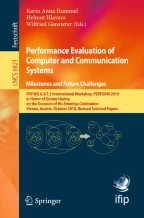Abstract
Opportunistic networks are one of the most promising evolutions of the traditional Mobile Ad Hoc Networks paradigm. Communications in an opportunistic network rely on the mobility of the users: each message is handed over from node to node, making hop-by-hop decisions to select the node that is better suited for bringing the message closer to its destination. Algorithms exploiting social-awareness are emerging as one of the most efficient categories of forwarding algorithms. However we are currently lacking analytical models able to characterize the performance of social-aware forwarding in opportunistic networks. In this paper we start to fill this gap by proposing an analytical model for the expected number of hops and the expected delay experienced by messages when delivered in an opportunistic social-aware fashion. The model is then used to characterize how the expected delay experienced by messages varies with the different social structures in the network of the users.
Chapter PDF
Similar content being viewed by others
References
Boldrini, C., Conti, M., Passarella, A.: Impact of social mobility on routing protocols for opportunistic networks. In: Proceedings of IEEE WoWMoM 2007, pp. 1–6 (2007)
Boldrini, C., Conti, M., Passarella, A.: Exploiting users’ social relations to forward data in opportunistic networks: The HiBOp solution. Pervasive and Mobile Computing 4(5), 633–657 (2008)
Boldrini, C., Conti, M., Passarella, A.: Modelling social-aware forwarding in opportunistic networks. Tech. rep., IIT-CNR (2010), http://bruno1.iit.cnr.it/~chiara/perform10_tr.pdf
Burleigh, S., Hooke, A., Torgerson, L., Fall, K., Cerf, V., Durst, B., Scott, K., Weiss, H.: Delay-tolerant networking: an approach to interplanetary internet. IEEE Communications Magazine 41(6), 128–136 (2003)
Daly, E., Haahr, M.: Social network analysis for information flow in disconnected Delay-Tolerant MANETs. IEEE Transactions on Mobile Computing, 606–621 (2008)
Fall, K., Farrell, S.: DTN: an architectural retrospective. IEEE Journal on Selected Areas in Communications 26(5), 828 (2008)
González, M., Hidalgo, C., Barabási, A.: Understanding individual human mobility patterns. Nature 453(7196), 779–782 (2008)
Groenevelt, R., Nain, P., Koole, G.: The message delay in mobile ad hoc networks. Performance Evaluation 62(1-4), 210–228 (2005)
Grossglauser, M., Tse, D.: Mobility increases the capacity of ad hoc wireless networks. IEEE/ACM Transactions on Networking 10(4), 477–486 (2002)
Haas, Z., Small, T.: A new networking model for biological applications of ad hoc sensor networks. IEEE/ACM Transactions on Networking 14(1), 27–40 (2006)
Hui, P., Crowcroft, J., Yoneki, E.: Bubble rap: social-based forwarding in delay tolerant networks. In: Proceedings of the 9th ACM MobiHoc, pp. 241–250. ACM (2008)
Karagiannis, T., Le Boudec, J.Y., Vojnović, M.: Power law and exponential decay of inter contact times between mobile devices. In: Proceedings of the 13th ACM MobiCom 2007, pp. 183–194 (2007)
Lindgren, A., Doria, A., Schelén, O.: Probabilistic Routing in Intermittently Connected Networks. In: Dini, P., Lorenz, P., de Souza, J.N. (eds.) SAPIR 2004. LNCS, vol. 3126, pp. 239–254. Springer, Heidelberg (2004)
Ott, J.: Application protocol design considerations for a mobile internet. In: Proceedings of First ACM/IEEE International Workshop on Mobility in the Evolving Internet Architecture, p. 80. ACM (2006)
Ross, S.: Introduction to probability models. Academic Press (2007)
Scott, J., Hui, P., Crowcroft, J., Diot, C.: Haggle: A networking architecture designed around mobile users. In: Proceedings of IFIP WONS (2006)
Silvis, J., Niemeier, D., D’Souza, R.: Social networks and travel behavior: Report from an integrated travel diary. In: 11th International Conference on Travel Behaviour Reserach, Kyoto (2006)
Spyropoulos, T., Psounis, K., Raghavendra, C.: Efficient routing in intermittently connected mobile networks: The multiple-copy case. IEEE/ACM Transactions on Networking 16(1), 77–90 (2008)
Spyropoulos, T., Psounis, K., Raghavendra, C.: Efficient routing in intermittently connected mobile networks: The single case. IEEE/ACM Transactions on Networking 16(1), 63–76 (2008)
Spyropoulos, T., Turletti, T., Obraczka, K.: Routing in Delay-Tolerant Networks Comprising Heterogeneous Node Populations. IEEE Transactions on Mobile Computing, 1132–1147 (2009)
Vahdat, A., Becker, D.: Epidemic routing for partially connected ad hoc networks. Tech. Rep. CS-2000-06, Duke University (2000)
Zhang, X., Neglia, G., Kurose, J., Towsley, D.: Performance modeling of epidemic routing. Computer Networks 51(10), 2867–2891 (2007)
Author information
Authors and Affiliations
Editor information
Editors and Affiliations
Rights and permissions
Copyright information
© 2011 IFIP International Federation for Information Processing
About this chapter
Cite this chapter
Boldrini, C., Conti, M., Passarella, A. (2011). Modelling Social-Aware Forwarding in Opportunistic Networks. In: Hummel, K.A., Hlavacs, H., Gansterer, W. (eds) Performance Evaluation of Computer and Communication Systems. Milestones and Future Challenges. PERFORM 2010. Lecture Notes in Computer Science, vol 6821. Springer, Berlin, Heidelberg. https://doi.org/10.1007/978-3-642-25575-5_12
Download citation
DOI: https://doi.org/10.1007/978-3-642-25575-5_12
Publisher Name: Springer, Berlin, Heidelberg
Print ISBN: 978-3-642-25574-8
Online ISBN: 978-3-642-25575-5
eBook Packages: Computer ScienceComputer Science (R0)
